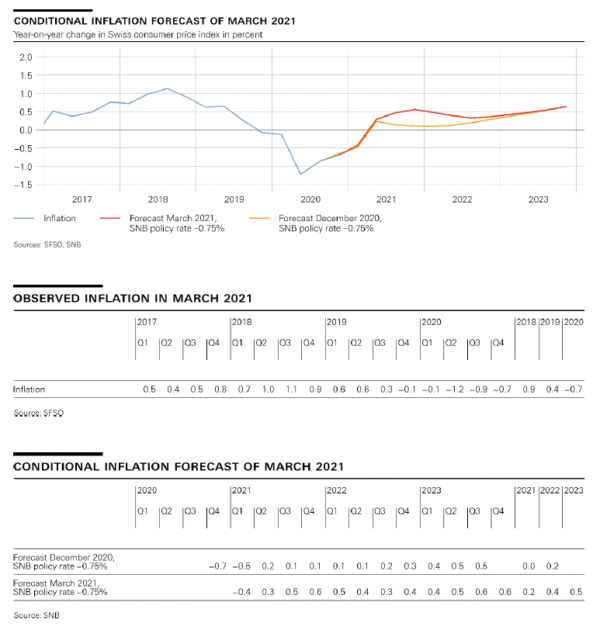The coronavirus pandemic is continuing to have a strong adverse effect on the economy. Despite the recent weakening, the Swiss franc remains highly valued. With a view to stabilising economic activity and price developments, the SNB is maintaining its expansionary monetary policy.
The SNB is keeping the SNB policy rate and interest on sight deposits at the SNB at −0.75%. It remains willing to intervene in the foreign exchange market as necessary, while taking the overall currency situation into consideration. It is also continuing to supply the banking system with liquidity on generous terms. The SNB’s expansionary monetary policy provides favourable financing conditions, counters upward pressure on the Swiss franc, and contributes to an appropriate supply of credit and liquidity to the economy.
The new conditional inflation forecast for 2021 and 2022 is higher than in December. This is primarily due to the rise in oil prices and the weaker Swiss franc. Looking beyond the two-year horizon, the inflation forecast is virtually unchanged compared with December. The forecast now stands at 0.2% for 2021, 0.4% for 2022 and 0.5% for 2023. The conditional inflation forecast is based on the assumption that the SNB policy rate remains at −0.75% over the entire forecast horizon.
Coronavirus and the measures implemented to contain it are continuing to shape the global economy more than a year after the outbreak of the pandemic. Following the strong recovery in the third quarter of 2020, economic growth worldwide was curbed by a renewed wave of infection. At the end of the year, GDP and employment were still significantly below pre-crisis levels in most countries.
The SNB’s baseline scenario for the global economy anticipates a phased easing of the containment measures in place in many countries over the course of the spring. The economic recovery is therefore likely to regain momentum from the second quarter. In addition to the expected progress with vaccination programmes, the monetary and fiscal policy measures introduced worldwide are an important source of support. Nevertheless, global production capacity will remain underutilised for some time to come.
This scenario for the global economy is subject to risks on the upside and downside alike. On the one hand, new waves of infection could weigh on economic activity again. On the other, the monetary and fiscal policy measures implemented could support the recovery more strongly than anticipated.
In Switzerland, the economic recovery has lost momentum since October 2020 in the wake of the second wave of the pandemic. However, economic activity has been restricted less strongly by comparison with the first wave in spring 2020. That said, value added has been seriously impacted in industries particularly affected by the containment measures.
GDP thus rose only slightly in the fourth quarter of 2020, this following robust growth in the previous quarter. A renewed decline is to be expected for the first quarter of 2021. The second wave of the pandemic is also taking its toll on the labour market. Short-time working has increased again in recent months, and unemployment has continued to rise.
Developments going forward hinge on whether there are renewed waves of the pandemic and which measures are implemented to contain them. The SNB’s baseline scenario anticipates that the containment measures in Switzerland will be eased further in the coming months, and that there will be no renewed worsening of the pandemic situation and tightening of the measures thereafter.
Against this backdrop, the SNB continues to expect GDP growth of 2.5% to 3% for 2021. Activity is thus likely to return to its pre-crisis level in the second half of the year. However, production capacity will remain underutilised for some time yet.
In the current situation, both the inflation outlook as well as the growth forecasts for Switzerland and abroad are still subject to high uncertainty.
Mortgage lending and residential property prices have risen further in recent quarters. The vulnerability of these markets thus persists and continues to present a risk for financial stability.

